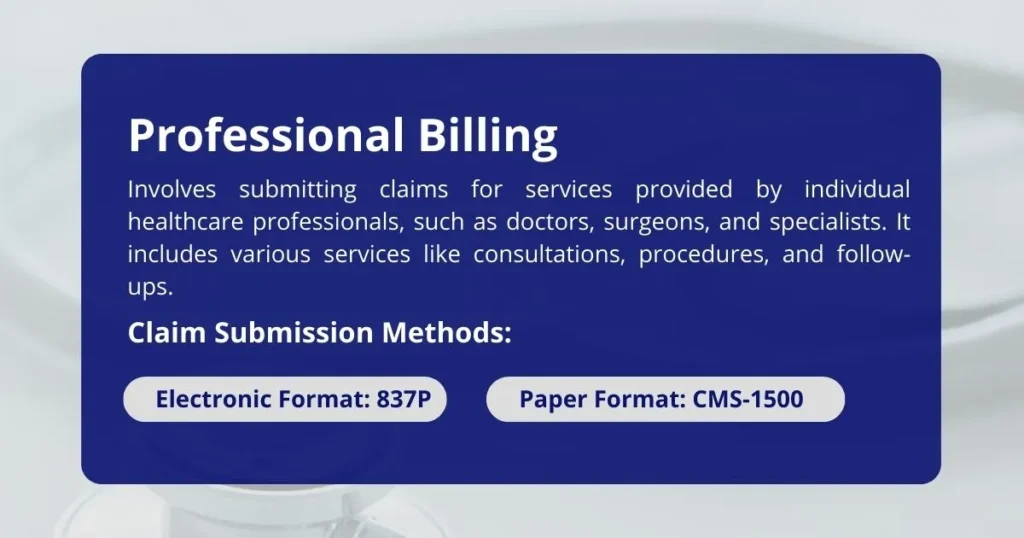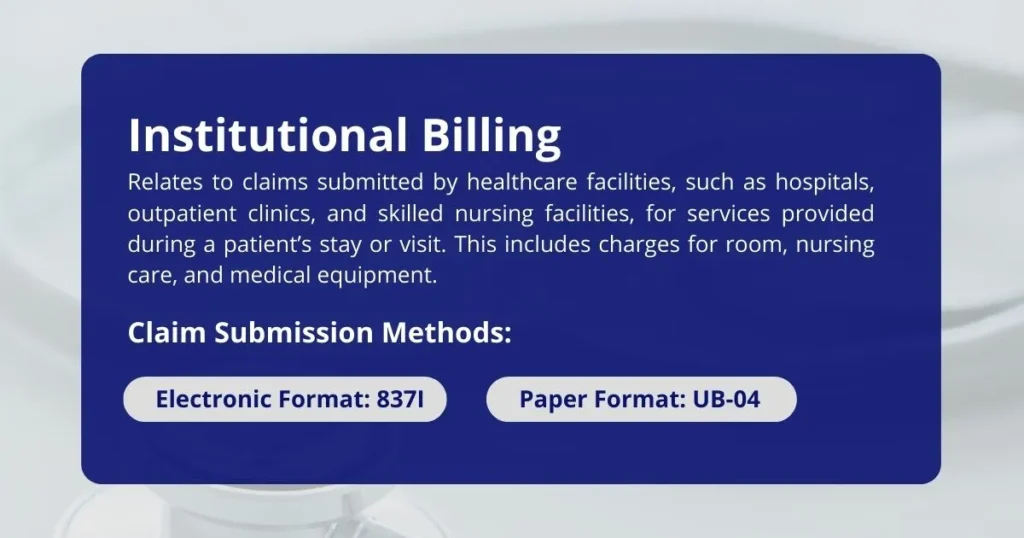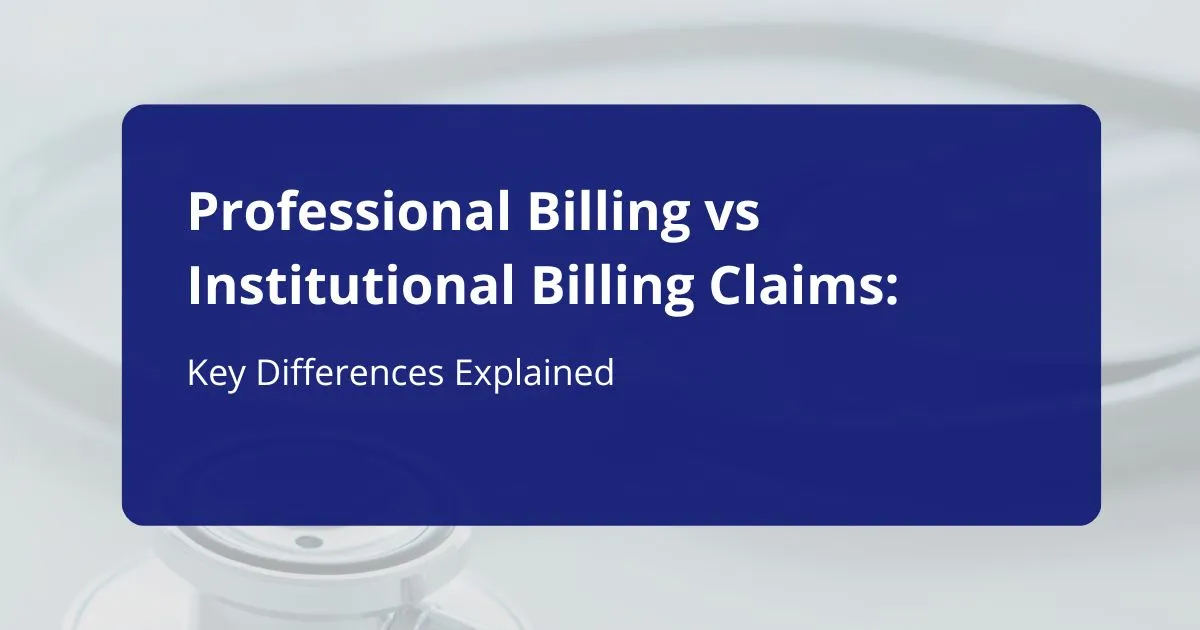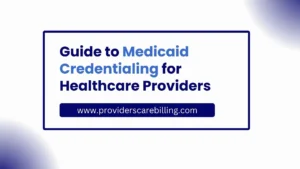Accessing the complexities of medical billing can be a daunting task, even for experienced healthcare professionals. With countless rules, forms, and requirements, understanding the nuances between professional claims and institutional claims is crucial to ensuring accurate reimbursements and reducing administrative burdens.
This blog will walk you through the key differences between professional billing vs institutional billing, highlighting their essential components, and offering insights into how they play a role in cardiology and other healthcare settings. Whether you’re a medical professional, a cardiologist, or a billing expert, this guide is meant to demystify these two types of claims and improve your billing workflows.
Professional Billing vs Institutional Billing: An Overview
Before we discuss key differences, it’s important to define what professional billing and institutional billing are.
What is Professional Billing?

Professional billing applies to claims submitted for individual healthcare providers like doctors, surgeons, and specialists. This type of billing is specific to services rendered by medical professionals, which may include consultations, procedures, and follow-ups.
Claims for professional services are submitted using the CMS-1500 form electronically as 837P files—hence the reference to 837p in professional claims processing.
What is Institutional Billing?

On the other hand, institutional billing pertains to claims associated with healthcare facilities like hospitals, outpatient clinics, or skilled nursing facilities. This includes a broader range of services, such as room charges, nursing care, or equipment used during a patient’s stay.
Institutional claims are submitted via the UB-04 form electronically as 837I files, tailored to the operational aspects of facility services.
Key Difference at a Glance
- Claim Forms: Professional uses CMS-1500/837P; Institutional uses UB-04/837I.
- Scope: Professional focuses on individual services; Institutional includes facility or overhead costs.
By understanding these distinctions, medical professionals can process claims more efficiently and reduce errors that lead to denied reimbursements.
Professional Claims vs Institutional Claims: A Detailed Comparison
When Are These Claim Types Used?
- Professional Claims: Used when billing for individual healthcare provider services, such as a consultation for heart disease or an outpatient cardiology test.
- Institutional Claims: Applied for inpatient stays, surgeries conducted in a hospital, or use of medical facilities and equipment.
Why Accuracy is Key
Both professional billing vs institutional billing claims demand the utmost accuracy and detail. Any data discrepancies like incorrect codes, missing documentation, or mismatched service types can result in delayed or denied payments.
Here’s an important takeaway for billing professionals:
- Use accurate CPT (Current Procedural Terminology) codes in professional claims.
- Ensure alignment of DRG (Diagnosis-Related Groups) codes for institutional claims.
Attention to these details avoids rejections and ensures smooth revenue cycles.
CV Professional Service vs Institutional Service
Cardiologists and cardiovascular service professionals must understand the unique billing processes specific to their field. The debate between cv professional service vs institutional service in cardiology billing is particularly significant.
Differences in Cardiology Billing
- CV Professional Service:
- Includes EKG interpretations, heart evaluations, or specialized outpatient cardiovascular procedures.
- Requires billing on 837P forms for services delivered by individual specialists.
- Institutional Service:
- Covers inpatient cardiovascular treatments such as surgeries, catheter lab tests, or hospital-based echocardiograms.
- Billed under 837I forms by the facility for resources and overheads.
Being cognizant of these differences impacts not just reimbursement amounts but also practice revenue for cardiology teams.
Facility Billing vs Professional Billing
When discussing facility billing vs professional billing, it’s important to highlight the division of responsibilities between providers and facilities.
Facility Billing
Facility claims focus on operational costs associated with managing patient visits in a hospital or clinic. These costs include room and board, consumables (like bandages or medications), and services like lab imaging.
Professional Billing
On the flip side, professional billing deals with the expertise of the healthcare provider, such as the doctor’s consultation fee or the cost of conducting an echocardiogram as an outpatient procedure.
Best Practices for Each Type
- For Facility Billing:
Streamline administrative processes by correctly linking UB-04 forms with resources used. Partnering with software solutions designed for scalability can help reduce mistakes commonly made during batch billing.
- For Professional Billing:
Focus on improving data mappings on CMS-1500 forms, ensuring CPT and modifier codes align to provide insurers with the clearest view of services rendered.
Why It’s Time to Master Professional and Institutional Billing
The healthcare industry is continually evolving, with new policies and systems emerging to promote efficiency in revenue cycle management. Mastering these billing intricacies, including professional billing vs institutional billing, is crucial for ensuring uninterrupted reimbursements while maintaining compliance with regulatory and legal mandates.
If you’re looking to simplify your billing processes and reduce errors, consider outsourcing to experts who specialize in both professional billing vs institutional billing—a move that can save your practice time and resources.
At Providers Care Billing LLC, based in Illinois, USA, we specialize in providing comprehensive medical billing and coding services to meet all your professional and institutional billing needs. Whether you’re managing outpatient cardiology tests or full-scale hospital operations, our customized solutions ensure seamless claims submissions for faster reimbursements.
Take Control of Your Medical Billing Today
Accurate medical billing doesn’t have to be overwhelming. By understanding the differences between facility billing vs professional billing and applying best practices, your business can stay ahead of billing complexities.
Looking to partner with billing professionals who understand the ins and outs of 837i vs 837p submissions? Connect with Providers Care Billing LLC today for a free consultation and boost your practice’s revenue cycle management.
For detailed cardiology billing tips, check out our article on Simplifying Cardiology Medical Billing Services.
Follow us on Facebook for more updates and expert billing insights.





